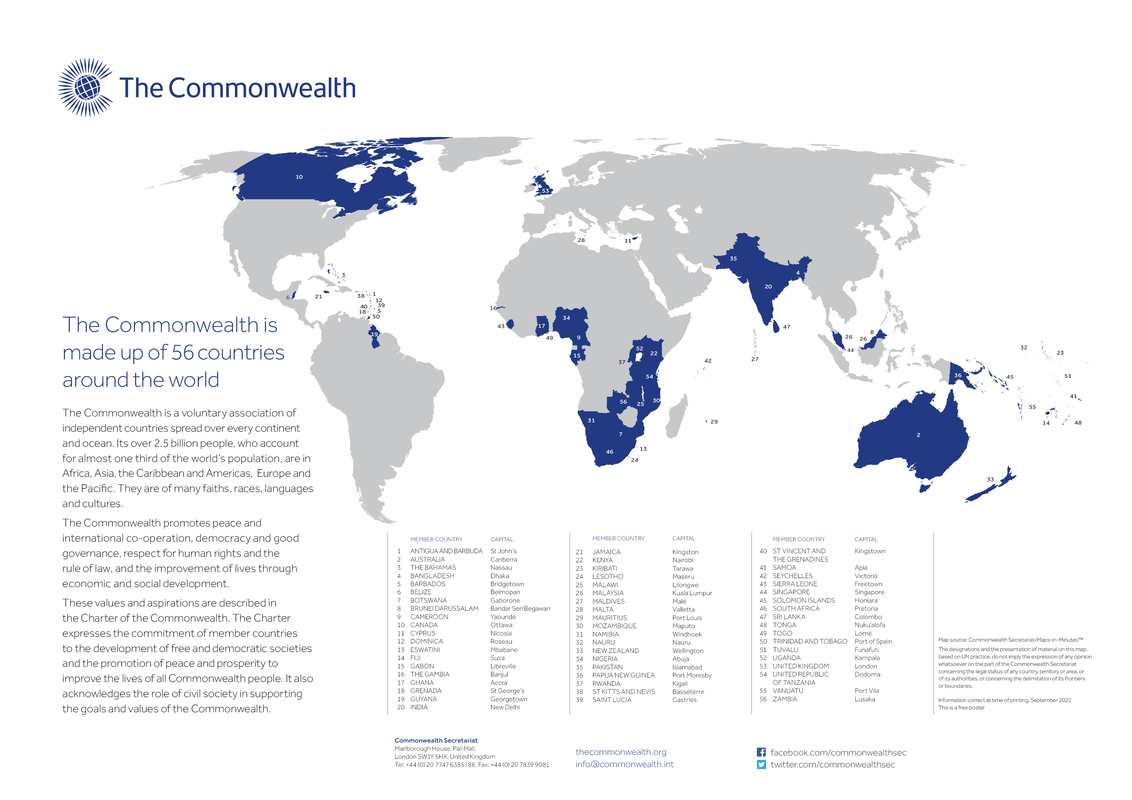
In the post-Brexit era, the United Kingdom, often referred to as the "Old Man of Europe" due to its long-standing economic and political history, faces both new challenges and opportunities in establishing robust trade relationships.
With the European Union no longer the primary trading partner, the UK has been exploring alternative markets to maintain its economic resilience. One promising area of focus has been its historical connections with Commonwealth countries. With over 2.5 billion people spread across 56 nations, the Commonwealth represents a valuable opportunity for strengthening overseas trade. By leveraging these long-standing relationships, the UK can tap into growing markets and diversify its trading portfolio.

The Commonwealth: An Historic Foundation
The Commonwealth, rooted in shared history, values, and a common language in many countries, offers the UK a unique advantage when seeking to establish stronger trade relationships. These nations, spanning Africa, Asia, the Caribbean, the Americas, Europe, and the Pacific, were once part of the British Empire, and while their political ties have evolved, cultural and economic bonds remain.
The Commonwealth’s diversity is one of its strengths. It includes developed economies such as Canada and Australia, emerging markets like India and South Africa, and small island nations in the Pacific and the Caribbean. The network of relationships fostered through the Commonwealth provides a natural platform for the UK to expand its influence and re-establish itself as a global trading power.

Trade Opportunities Across the Commonwealth
One of the key reasons Commonwealth countries represent a significant opportunity for the UK is their economic growth potential. Commonwealth economies, collectively, are forecasted to grow faster than the global average over the coming decades, with countries like India expected to become one of the largest economies globally. By increasing trade with these rapidly developing markets, the UK can secure access to new consumers, industries, and resources.
For instance, India, a member of the Commonwealth and the world’s most populous country, offers vast opportunities in sectors such as technology, pharmaceuticals, and textiles. A Free Trade Agreement (FTA) between the UK and India, currently under negotiation, could boost UK exports by billions and create opportunities for both economies to flourish. Similarly, Canada and Australia present openings in industries like energy, agriculture, and education, where the UK’s expertise aligns with their domestic needs.
Moreover, the Commonwealth’s developing nations offer potential for partnerships in sectors like infrastructure, healthcare, and education. Many of these countries are looking to modernise and improve their infrastructure, and UK companies, renowned for their engineering, financial services, and technology expertise, are well-placed to collaborate on such projects. Additionally, with the increasing importance of green technologies, the UK’s leadership in renewable energy and sustainability presents further possibilities for cooperation in building environmentally conscious economies.

Shared Language and Legal Systems: Reducing Trade Barriers
One of the significant advantages of trading with Commonwealth countries is the relative ease of doing business. Many Commonwealth nations share common legal frameworks based on English law, a legacy of British rule. This shared legal system can simplify contract negotiations, dispute resolutions, and regulatory compliance, making it easier for UK businesses to enter these markets. Additionally, the English language is widely spoken across the Commonwealth, further reducing barriers to communication and trade.
These shared legal and linguistic frameworks create a level of familiarity that can foster trust and long-term business partnerships. The absence of significant language or legal hurdles means that the UK can more easily engage with these markets compared to others where legal systems and language may be more complex.

Commonwealth Advantage: Trade Cooperation and Agreements
The Commonwealth Advantage refers to the observation that trading between Commonwealth members is generally more cost-effective than trading with non-Commonwealth countries. According to the Commonwealth Secretariat, trade costs are estimated to be 21% lower between Commonwealth countries due to shared language, similar legal systems, and a legacy of cooperation. This makes the Commonwealth a particularly attractive bloc for UK businesses looking to expand internationally.
The UK has already begun to capitalise on this advantage. For example, in 2021, the UK signed the UK-Australia Free Trade Agreement, which removed tariffs on certain goods and services, allowing for increased access to each other’s markets. This agreement is expected to boost the UK’s economy by £2.3 billion by 2035. Similar trade deals are in the works with New Zealand and Canada, further solidifying the UK’s position within the Commonwealth.
Mitigating the Risks of Over-Reliance on Europe
While the European Union remains an important trading partner for the UK, the volatility surrounding Brexit negotiations and evolving regulatory frameworks has highlighted the risks of over-reliance on one region. Diversifying its trade relationships with Commonwealth countries can help the UK mitigate these risks and create a more balanced, resilient trade strategy.
Commonwealth nations offer geographic diversity, reducing the risk of supply chain disruptions caused by regional instability or political tensions. For instance, by sourcing goods and services from countries in different hemispheres, the UK can avoid over-reliance on European supply chains that may be vulnerable to political or economic upheaval. This diversification is particularly important in a world increasingly impacted by global crises such as the COVID-19 pandemic and geopolitical tensions.

Building on Diplomatic and Cultural Ties
Beyond economic considerations, the UK’s diplomatic and cultural ties with Commonwealth countries provide a solid foundation for expanding trade. Initiatives like the Commonwealth Heads of Government Meeting (CHOGM) and the Commonwealth Business Forum foster dialogue and cooperation on economic, political, and social issues. These platforms provide the UK with unique access to leaders across a diverse range of countries, allowing it to strengthen bilateral relationships and explore new opportunities for trade collaboration.
The Commonwealth’s focus on shared values, including democracy, human rights, and sustainability, also aligns with the UK’s broader foreign policy goals. By championing these values in its trade agreements, the UK can position itself as a trusted partner to Commonwealth nations, ensuring that trade is not only profitable but also ethically aligned.

In a rapidly changing global economy, the UK must look beyond Europe to ensure its long-term economic success. The Commonwealth, with its shared history, legal frameworks, and economic potential, presents a compelling opportunity for the UK to strengthen its trade relationships and secure its position as a global trading power.
By focusing on Commonwealth countries, the UK can diversify its trade portfolio, reduce risk, and build on diplomatic and cultural ties to create mutually beneficial partnerships for the future. As the Old Man of Europe steps into a new era, the Commonwealth could play a vital role in shaping its economic landscape.
Published - 15/10/2024







You must be logged in as a member to add comments.
Become a member
Already a member? Log in or create an account.